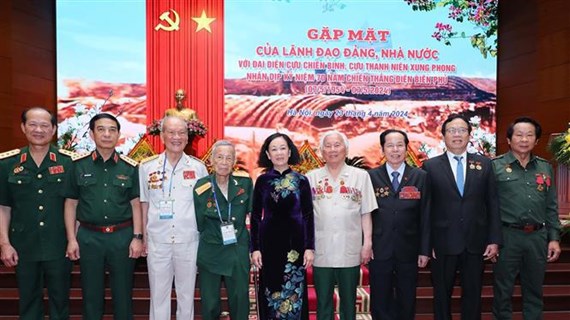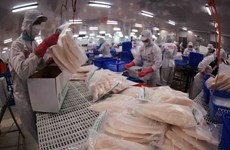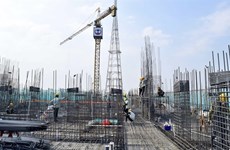Rising oil and gas prices would put brake on economy: expert
The escalating oil and gas prices would reduce and even neutralise the effect of the 2-percent VAT cut which was intended to stimulate consumption, stir growth and reduce inflation pressure, thus resulting in failure to achieve the growth target, losses to the budget and rising inflation, according to Nguyen Bich Lam, former Director General of the General Statistics Office (GSO).
 Within a month, retail petrol prices had increased for three consecutive times, with the latest rise on February 11. (Photo: VNA)
Within a month, retail petrol prices had increased for three consecutive times, with the latest rise on February 11. (Photo: VNA)Hanoi (VNA) – The escalating oil and
gas prices would reduce and even neutralise the effect of the 2-percent VAT cut which was intended to stimulate consumption, stir growth and reduce inflation pressure, thus resulting in failure to achieve the growth target, losses to the budget and rising inflation, according to Nguyen Bich Lam, former Director General of
the General Statistics Office (GSO).
Within a month, retail petrol prices had increased for three consecutive times, with the latest rise on February 11.
The hike was due to the soaring global oil and gas prices, plus a reduction of Nghi Son Refinery and Petrochemicals LLC’s output due to financial difficulties, the expert explained.
The prices would continue to surge in the time ahead as countries are restoring production, business, transportation and tourism services after the COVID-19 hiatus, Lam said, citing an announcement of the Organisation of the Petroleum Exporting Countries (OPEC) on February 10 that world oil demand might rise even more steeply this year as the global economy posts a strong recovery from the pandemic, a development that would underpin prices already at a seven-year high.
The rising global oil and gas prices will affect domestic production as oil and gas cost makes up around 3.52 percent of the economy's total production costs, thus pushing up product prices, he said, adding that the impact can be felt clearly in such areas as fishery and transportation.
Moreover, the high oil and gas prices would exacerbate pressure on the consumer price index (CPI), weaken competitiveness of made-in-Vietnam products and hamper economic growth indirectly.
According to Lam, a 10 percent increase in oil and gas prices results in a 0.5 percent decrease in the national gross domestic product (GDP), and a 0.36 percentage point rise in CPI.
To achieve socio-economic targets this year, with GDP growth set at about 6-6.5 percent and CPI at around 4 percent, Lam suggested the Ministry of Industry and Trade take synchronous solutions to ensure the long-term supply of oil and gas.
The ministry should propose the Government expand and improve the capacity of oil and petrol reserves for the long run, thus easing the reliance on and adverse impacts of rising global oil and gas prices.
The Ministry of Industry and Trade, the Ministry of Finance and businesses need to keep a close watch on the world’s oil and gas market and political developments that can affect supplies, so as to timely set out flexible countermeasures, while raising domestic exploitation and refinery capacity, he said./.
Within a month, retail petrol prices had increased for three consecutive times, with the latest rise on February 11.
The hike was due to the soaring global oil and gas prices, plus a reduction of Nghi Son Refinery and Petrochemicals LLC’s output due to financial difficulties, the expert explained.
The prices would continue to surge in the time ahead as countries are restoring production, business, transportation and tourism services after the COVID-19 hiatus, Lam said, citing an announcement of the Organisation of the Petroleum Exporting Countries (OPEC) on February 10 that world oil demand might rise even more steeply this year as the global economy posts a strong recovery from the pandemic, a development that would underpin prices already at a seven-year high.
The rising global oil and gas prices will affect domestic production as oil and gas cost makes up around 3.52 percent of the economy's total production costs, thus pushing up product prices, he said, adding that the impact can be felt clearly in such areas as fishery and transportation.
Moreover, the high oil and gas prices would exacerbate pressure on the consumer price index (CPI), weaken competitiveness of made-in-Vietnam products and hamper economic growth indirectly.
According to Lam, a 10 percent increase in oil and gas prices results in a 0.5 percent decrease in the national gross domestic product (GDP), and a 0.36 percentage point rise in CPI.
To achieve socio-economic targets this year, with GDP growth set at about 6-6.5 percent and CPI at around 4 percent, Lam suggested the Ministry of Industry and Trade take synchronous solutions to ensure the long-term supply of oil and gas.
The ministry should propose the Government expand and improve the capacity of oil and petrol reserves for the long run, thus easing the reliance on and adverse impacts of rising global oil and gas prices.
The Ministry of Industry and Trade, the Ministry of Finance and businesses need to keep a close watch on the world’s oil and gas market and political developments that can affect supplies, so as to timely set out flexible countermeasures, while raising domestic exploitation and refinery capacity, he said./.












